
Staff Sergeant
Charles O. Beardslee
Prelude
Signing Up
Africa
Sicily
Italy
Anzio
Southern France
Vosges
Colmar Pocket
Wounded
Going Home
![]()

Colmar Pocket Jan-Feb 1945

Loading the anti-tank gun.
In mid-December my unit moved about 20 miles south of Strasbourg and set up a roadblock on a main road. On the second day there we were ordered to give our anti-tank guns to French troops who were going to take the city of Colmar about 60 miles south of where we were. Without the anti-tank guns we didn't have a very effective roadblock and with the French holding the line we didn't have anything to do.
The platoon occupied a small country schoolhouse that looked like the Germans had occupied earlier because there was straw on the floor. Why the German's always seemed to have straw on the floor w I could never figure out. We cleaned up the straw by sweeping it outside. With 20 or so men in rooms that were only 20 by 30 feet it was warm enough to sit around in our shirt sleeves. So this turned out to be a better break than the barn we left behind in Strasbourg.
We slept late, sat around, read pocket books, wrote letters. Every night we opened up one of the kegs of beer we "captured" and sat around on the floor and playing poker usually until about one in the morning. We wished the French much success but we knew that it would be a futile effort on their part. They had been poking at this bulge in the line encircling the French city of Colmar for several weeks without much success.
We were glad to have the time just to keep our poker debts straight and argue over who was owed what and how much. We played with matches because nobody had any money. We had not been paid since we landed in southern France four months earlier.
After a week the French brought our guns back. Just as we thought they had not been fired and the French soldiers admitted they never used them nor did their line move at all. It seemed to have been just an exercise in cooperating with our allies.
As soon as we get our guns back we were ordered to move out.
Winter had been coming on a little more each night and now we had to leave our nice warm little schoolhouse. The whole regiment was to head back through the mountains and with the objective the town of Kaysersburg.
Kaysersburg/Rest Camp

A map from the "History of the 15th Regiment" shows the frontline around the Colmar Pocket.
It was about 4:00 in the afternoon when the trucks stopped and we unloaded onto a snow-covered ground. I no more than hit the ground when someone came up to me and told me Private Groundin to leave our rifles and ammo and get in a 6x6 that was leaving for a rest camp located in Bath les Bains. We were not unhappy about missing the attack on Kaysersburg.
At the rest camp about 6:00 in the evening we were assigned rooms and went to dinner and saw a movie. After breakfast the next morning I saw a dentist for two fillings and a denture repair that took a couple of days to complete. At least if I got clobbered I would have a good set of teeth.
I spent the next day cleaning up and getting new clothes. It felt good to have something clean against my skin. I also listened to music and it was a whole lot better than listening to artillery and machinegun fire. You can't imagine how good music sounded to me after so long without.
On the last night at rest camp Groundin got us invited to dinner at the local butcher's home. We ate fresh roast beef and all was good. I am sure not many in town were eating fresh roast beef that night. Dessert was an apple pie. We couldn't thank these people enough and they wanted to thank us for what we were doing for them. The next day we loaded back in a 6x6 to head back to the horrors of combat.
We met up with our company about 6:00 that evening. It was Christmas Eve 1944 and the squad was tucked into a house where I found my pack with a blanket and my B.A.R. I sat in an empty corner with a C Ration and started to feel sorry for myself with thoughts of the wonderful dinner the night before.
Hike to the Raider Platoon
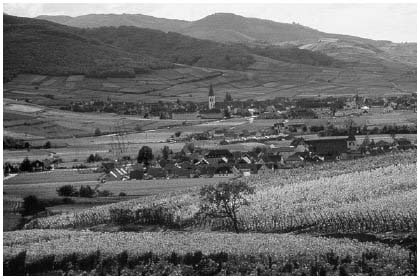
A modern-day view of Ammerschwihr.
I dropped off to sleep and after a few hours Sergeant Leaser woke me to tell me to move my squad to the front and attach to the Regimental Raider Platoon. The front was four miles up a mountain that overlooked Kaysersburg. I told everyone the terrible news.
The squad had been on the line before and knew where to go. We left at 0100 and we made the top at 0400. The moon was bright and made it easy to see but our load slowed us. We had to carry a .50 cal. Machinegun, ground mount, four boxes of ammo up the mountain in addition to our own rifles, ammo and packs.
I had the extra gear spread out and rotated but two of the guys couldn't even lift the 85-pound receiver let alone carry it anywhere. The gun barrel was 80 pounds, the mount was 45 pounds and the four boxes of ammo weighed 20 pounds each.
At times we needed to rest every 500 yards. The temperature was about 10 degrees and we were soaked with perspiration when we reached our position. We still had to dig-in the gun and our foxholes.
By morning we were done and as the Raider Platoon had breakfast we lined up with them. Scrambled eggs, bacon and pancakes that came in by jeep. I was a bit pissed off to find there was a jeep trail.
I was on the phone telling a few people we were screwed and to send up six boxes of ammo and a radio so we could register our mortars and send it by jeep ASAP.
On Christmas Day 1944 we gathered some sand bags and spent the day improving our positions with sand bags. The A&P platoon came up and put barbed wire in front of our position and it was at this time we were told that they expected a big attack by the Krauts since they were not all that successful in their attack in the Ardennes to the north that they were going to try something here.
That was the reason for the Raider Platoon being on the front line as normally their function was to pull combat patrols and then stay back behind the lines where their kitchen could be set up. Having hot food was one of the incentives for volunteers to join the Raider Platoon.
Anti-tank platoon First Battalion was part of this volunteer group and the thing was we didn't volunteer at all. We just joked about it and did our soldierly duty. Later that afternoon I called our mortar section and asked for a round of smoke ahead of our map coordinate. When the round came in it hit only about ten feet from my hole. You can bet that I had them correct that. I got them to land about 75 yards in front of us.
I kept two men on the machinegun 24 hours a day. Later we heard that the Germans had made an assault in the low lands around Strasburg and that French forces held them off.
We stayed attached to the Raiders for about eight days and we were glad to help them eat their kitchen food and particularly the fresh cooked meat. When the Raiders left the line we pulled up stakes and moved down the mountain ridge where we looked down on the town of Ammerschwihr.
No troops were inside the town because the air force bombed it every day for about a week while we sat on the mountain and watched. Major Porter came around the day we moved out there and told me they were getting a lot of counterattacks from Ammerschwihr and he wanted us dug in.
I had the squad dig a hole five feet deep and then at night we cut eight-inch logs and put them over the top. We had a firing port set and then we camouflaged it with dry leaves and dead tree branches. It looked like an old pile of brush.
We camouflaged our gun position so well that the following day the Major brought up the regimental commander, Colonel McGarr to show him how well we were prepared. The colonel stood three feet from our 50-caliber machinegun and he didn't see it. Major Porter asked me were my gun was and when I pointed it out to him he was a little embarrassed. Now that's camouflage at its best.
The next day, 200 Kraut's attacked C Company with a force of about 200 Krauts. They were repelled without any difficulty but if they had broken through our area we would have been cut off from the rest of the battalion.
A New Year

A Tank Destroyer moves through Ostheim in the Colmar Pocket
On The 5th of January the First Battalion of the 254th Infantry Regiment and the First Battalion of the 30th Regiment relieved the First Battalion. My unit went into reserve and moved back to Riquewihr. All fine except I was left to show this new outfit what to do. I took them out on night patrols and told them to stay in their foxholes during the day.
I later told the men in my platoon about the 254th. It was a National Guard unit fresh from the states and it was the men's first time on the line. They had much to learn and only time in the line could teach them. I felt sorry for them because a lot of them were from the same town and many were related. One fellow come in crying that his uncle had been killed and a couple of friends seriously wounded I felt so sorry for them but as the French say "Se la guerre".
There was so many of them that it was difficult to keep them down and so we drew a lot of artillery fire and a few got hurt. I was ordered to stay for four days and when that passed I got the hell out of there and hitch-hiked back to Riquewihr. It was about 10:00 at night when I got to the town and found a kitchen.
I went in and asked if there might be some food available for a hungry dogface. The cooks were all about ready to go to bed and they couldn't believe that I was alive. They thought I had been killed. When someone was killed we never talked about it because you never knew but the next time it could be you.
You didn't discuss death because it was around everyone all the time. Once in a while we joked about it but never about those that had been killed.
The cooks scraped together a real good meal for this hungry dogface and broke out a bottle of wine. We sat around and talked until almost midnight before I found the house where the anti-tank platoon bedded down and I got to sleep.
The cooks certainly put themselves out for me and I was very appreciative. I never believed anyone ever gave me much of a thought but I went to bed thinking how good those men in the kitchen made me feel. The following day, after breakfast I got a hot shower and some clean clothes.
Hot Shower
The army winter field shower is not what the normal civilian would think of a shower. Showering was done by the numbers. Six men entered the shower and each would line up with a showerhead. Then the person that ran the shower would give a one-minute burst of water and then it was turned off. Each soldier would soap up for a minute and then the water was back on for two minutes to rinse. Each shower lasted a total of four minutes.
This was hardly satisfying when sometimes it had been a month or more since the last one but it was better than nothing. After the shower over you would go down a line and were asked your size of trousers, shirt size and so forth but if your size was not available you got the nearest. The only clothes you kept were shoes, belt, gloves and field jacket.
My last day off the line I took a nap in the afternoon, had dinner and went to a movie. I went back to the warm house for a good night's sleep with lots of appreciation because outside the nights were getting down to ten degrees below zero.
The next day we moved to Ammerschwihr the town we looked at from the mountain. The front line was about a mile from town. I had the anti-tank gun placed about 300 yards behind the rifle companies as it was a good place for a defensive weapon.
We found a four-foot culvert that ran under the road and we used it for shelter and fire protection. The anti-tank gun was placed at one end of it. I found a door and laid it over about six inches of ice that occupied the bottom of the culvert. I put a shelter half down on the door and my German sleeping bag on that and two blankets on top and I managed two survive the sub-zero temperature.
Well-dressed G.I.

Third Division soldiers wearing winter "spook suits" train near the Colmar Pocket.
It really was difficult to be comfortable. I wore two pairs of wool long johns and two pairs of socks in my shoepacks. I had on my regular O.D. shirt with a sweater over that and a field jacket over the whole thing. I had so many clothes on, my pistol belt was extended to its maximum to go around my middle. If I had been captured the Germans could have clothed two men with what I had on.
We stayed in this position for about eight or nine days. At night when I took my two hours on the gun my feet would get so cold and I found that if I heated my canteen of water and then slipped it back into its insulated cover it would slowly radiate heat through the cover and helped to warm my feet.
We all took turns going back into the town where Sgt. Leaser had the platoon C.P. set up in the basement of a bombed-out building. Every two or three days a couple of us would spend a few hours back there where we could heat water and wash up a bit and shave. Orders were to shave at least every other day but we would stretch it sometimes. The army was all a matter of cleanliness and orders.
At our gun position there was a frozen German soldier only about ten feet away. I wanted him out of our area so each day I got on the phone and called Graves Registration and asked them to come and pick him up and put him where he belonged. It would help to clean up the area. Every time I called they always promised to be right up the next day but after five days I gave up and wondered how long they would leave my body on the battlefield.
Another thing that happened during our stay outside Ammerschwihr was that each morning about 0500 we could hear a horse come clopping up the road out in front of us. We assumed that it was pulling a wagon and bringing up supplies to the Germans.
I wanted so much to shoot a few mortar rounds in that direction. The rifle companies were not talking any action and I couldn't understand why but I couldn't jeopardize their positions just to satisfy my own ego. This was a war and needed to have everyone's cooperation but damn it I liked to shoot at the bad guys because they certainly shot at me enough during these past 26 months.
After about twelve days we were relieved. The relief came up with about 40 trucks and as they got out we were supposed to get in and get out of there quick. All of these trucks made so much noise that the Germans started throwing in some artillery rounds.
This caused the truck drivers to get nervous and extremely anxious to get out of the area. The truck that we were to get on was moving about five miles an hour and an other man in my squad and I were running after the damn thing trying to get a ten gallon jug of Calvados up on the tailgate.
Calvados is a very powerful clear apple brandy and ten gallons could get a whole army drunk. We finally boosted the jug onto the truck with the help of some men already inside. We scrambled on and went back to Riquewihr. Back to the showers and clean clothes and with the ten gallons of Calvadose every drinking man in the battalion was loaded.
This was to be a short stay and while we were there it snowed almost a foot. We all managed to get cleaned up and see a couple of movies, write letters home and get our mail. I got a letter from Patricia that that helped to cheer me up.
After we rested four days we loaded up to take part in the big push to clear the Colmar Pocket. With a foot or more of snow on the ground, nights so cold they defy description and the ground under the snow frozen so hard it was almost impossible to dig in we advanced into enemy territory.
Fighting with B Company
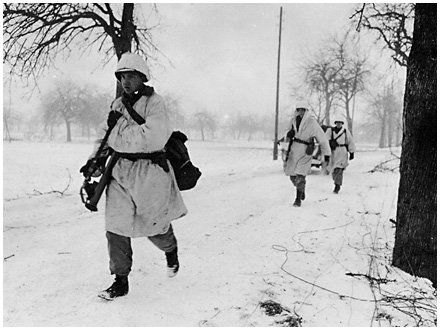
The Third Division in snow camouflage advance from Ostheim in the Colmar Pocket.
On January 22, 1945 my squad was attached to B Company and we were carrying bazookas and a lot of ammo. I was leading my squad and following a B Company rifleman. The time was around 2300 and the moon on the snow made things almost as bright as day. The moonlight made the snow and ice sparkle.
I was walking along stepping in the same tracks the fellow ahead of so if there were any mines in the he would set it off and not me. As we passed through a barbed-wire fence it happened. He stepped on a mine only ten feet ahead of me. I heard it pop as the cap went off but the main charge didn't go off. It stung his foot but he wasn't hurt. We continued the advance across a large field and then cut into the woods.
As we entered the woods we came to a canal that was about 25 feet across with a berm of dirt about three feet high on each side. All of a sudden I saw that we had company on the other side and as I caught up with the man ahead I asked him who the hell he thought it was over there.
He didn't know so I dropped back and asked a man in my squad if he recognized the men on the other side and he didn't have a clue. All of a sudden we started shooting at each other and in the next two minutes we must have fired 5,000 rounds and I don't think that anybody was hit. When I stood up and looked across to the other side they had all disappeared and there were no bodies lying around.
Whoever it was just seemed to fade away into the forest and we continued on our way. We finally stopped about an hour later and I spent the rest of the night digging a hole. I figured it would keep me from freezing if I continued to work. About 5:00 in the morning I got tired enough to lie down and catch a wink or two. About 9:00 we moved on down the road.
After a short distance we came across three jeeps along the road and the Red Cross girls were passing out hot coffee and doughnuts. I never thought they operated that close to the front but then again I never knew where the front was a lot of the time. I was certainly thankful for that hot coffee and they gave me a half-dozen doughnuts.
I ate a couple while I drank my coffee and put the other four in my pack for later. That evening after a C Ration feast I needed something to take the taste out of my mouth so I broke out one of the doughnuts from my pack and found the thing was frozen. I finally worked my fork into it and heated it slowly over a Coleman burner.
I had a small jar of strawberry jam someone had sent me so I put some jam on the hot doughnut and I had a dessert fit for a king. Only the men going through the hell that we were experiencing at that time could remember something so simple as a little jelly on a hot doughnut for a dessert.
The Maison Rouge Bridge
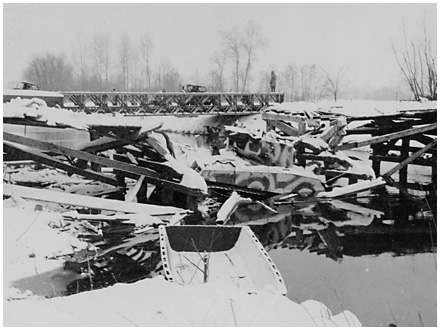
The lead tank on the assault across the Ill River collapsed the bridge leaving the advancing Infantry without armor support.
Early next morning we pressed on. It was cold and cloudy and snowing lightly. At about 5:30 in the morning we crossed over a bridge the engineers built the night before across the canal. The Infantry crossed over without trouble and we started our attack on the other side. After we had gone a 1,000 yards the Germans blasted us with five tanks and it was devastating.
The shells hit all around us and tore into the frozen soil making huge black craters in the snow all around us. The machinegun bullets were cracking right over our heads and we were pinned down in a frozen hell.
The company commander promptly called for tank support and we were told that the first tank to cross the bridge had fallen through and that we were on our own. The anti-tank platoon's bazookas were useless because they would only shoot 200 yards and the tanks were over a half-mile away moving slowly toward us.
We called in our last option: artillery. The barrage opened up with a 100 guns and forced the Kraut tanks to take cover. Then came a curtain of to screen us as we made our way back to the canal and safety on the other side. I heard that there were men in the rifle companies that drowned trying to cross but we had no trouble as the water only came up to a little past waste deep. By the time we got back to the nearest village our clothes were frozen stiff.
As my squad walked along I felt the coldest I ever felt in my life. Our truck was there in the village and most of us had some spare clothes stuffed in the corners. Everyone had an extra blanket somewhere that was dry and we had a giant blowtorch that we liberated from the Wehrmacht months earlier. The luck was ours but I certainly felt sorry for the men in the rifle companies that didn't have a truck to get things from like a few dry clothes and something to get warmed by.
The following day the 15th Regiment made an attack and got their tanks across the canal but it was still very difficult as several tanks were lost in the battle. It was on this day that Audie Murphy won his Congressional Medal of Honor. Thanks to him a German counterattack failed.
Wicherschwihr and the Colmar Canal
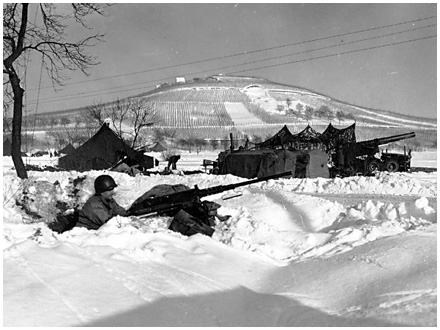
An artillery unit supporting the action in the Colmar Pocket is dug deep in the January snow.
After a day of drying out and getting our body temperatures back to normal we shoved off on another attack. We moved on to village of Wicherschwihr near the Colmar Canal. No tanks were expected on our side of the canal so there was no need to put in roadblocks. The platoon found and occupied a farmhouse. We only had about 18 men left in the platoon due to the terrible weather and wounds from the tree bursts caused by artillery fire.
The farmhouse that we stayed in was only 100 feet from the riflemen so we weren't that far from the front line. There were two barns behind the house one had hay and feed for the livestock and the other held the livestock. The horse barn was on fire and it smoldered for several days. We tried to get the horses out but they would turn around and go back in so we gave up and just left the gates open.
Booby Trap
The first night we were there one of the riflemen that had dug his hole in the dirt floor of the feed barn came in the house and wanted to take a mattress off the bed that I planned to sleep on and I told him that I was going to sleep on that bed and that he could put some hay in the bottom of his hole.
The other men in the platoon jumped all over that on and said he was the one sleeping out side and that I should let him have the mattress. I gave in and groaned about having to sleep on the floor.
Some of the men helped him carry the mattress to the barn. The rifleman threw it into his hole and jumped on top and it blew up. It had been booby-trapped and I had come that close to sleeping on it.
It took the man's foot off. I called for a medic that came in a jeep with a litter and the soldier was taken to the aid station for immediate medical attention. He was in a doctor's care within 15 minutes of the explosion.
Hog Heaven
The next day three or four men in the platoon got a pig that was in a pen beside the barn and butchered it. They hung it up and skinned it. Then it was cut in half. The first half was eaten in the next four days.
That night we all had pork chops and steaks and French-fried potatoes. All of the stuff we needed was available in the house. The basement was full of canned fruit and vegetables and several hundred pounds of potatoes. We really had an extensive kitchen operation going.
The hog carcass was hung outside where it froze solid during the night and whoever was on guard was required to keep the dogs away. On the third night about around 9:00 we were sitting around playing cards, reading, or writing letters when all of a sudden we heard two shots fired by the men in the barn. We grabbed our rifles and ran to the barn only to discover that the riflemen had shot two of our own men. They were engineers who were going across the field to see where they could put a bridge over the Colmar canal.
They failed to report their mission to the company or battalion headquarters. They were also wearing overcoats that nobody wore in any of the line companies of the Third Division. The German's wore overcoats and anyone that wore an overcoat anywhere near the front at night was going to get shot at by our men. This shooting was a disaster that could have been avoided. All we could do was forget the incident and get on with the war.
On the sixth night in our farmhouse we heard we would be moving out so we found a clean sheet and wrapped what was left of our still-frozen pig and put it on our truck. Somebody found a couple bottles of wine to celebrate our last dinner in the school but it was a short night because we were to be at the line of departure at 2:00 in the morning.
For some reason I was feeling very uneasy about the attack I thought that battle fatigue was getting to me. I had to go lead my squad there was no way I could say to my company commander that I wanted to sit this one out. I could have gone and asked for my promotion from corporal to staff sergeant since I had been acting squad leader for two months with no promotion. Yet I didn't think the $30 a month increase in wages would take away the fear that was creeping into every cell in my body. I was acting just fine on the outside but there was something there that I never felt before.
Into the Fray
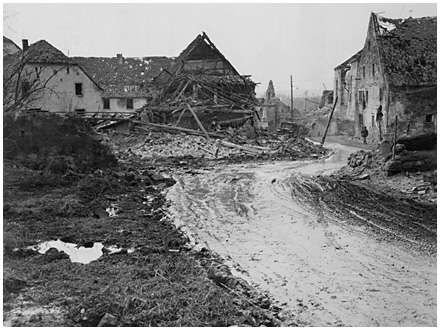
The trail through the ruins of Urschenheim. As the weather warmed, mud replaced the snow as the problem of the day.
At 2:00 we were on the line of departure and waiting for our artillery to start pounding the hell out of the enemy. As soon as it started the enemy's responded by pounding us so the only thing to do was move forward and let it fell behind. We moved ahead a 1,000 yards ands saw two figures coming toward us. We could barely make out that they were carrying a white flag. We were still 1,000 yards from the German line.
I took the two men prisoner and sent them two the rear with one of the men in my squad, but not before I relieved them of two Lugers. They were the prized item and I had them. This helped raise my spirits a bit and I moved out with renewed enthusiasm. An enemy machinegun to our left front had stopped firing and we moved into the trees unimpeded to the German line. A half hour later our truck moved up with the anti-tank gun and while we were digging it in along came a whole company of German soldiers and we didn't have our gun in position. There was only six of us so we held our breath as 200 got past without spotting us.
After they had gone about 50 yards beyond I cut lose with my B.A.R. into their rear as the front of their column ran into one of our scout cars with a 37mm gun with a good supply of canister ammo. We both opened up at the same time and we killed or wounded about 60 enemy soldiers scattering the rest of the company so they were an ineffective fighting unit. We figured after that carnage they would not reorganize and start a counter attack.
Around 10:00 we moved forward about 2,000 yards into the woods with no resistance. We dug in around what appeared to be a woodcutter's shack. There were three riflemen from B Company in the shack. I asked if they planned on staying there. As I came in the door and started to an armor-piercing shell came through the wall and hit the man I was talking to in the face. The rotation of the shell spun his head in a perfect circle on the wall behind him. I starting gagging but couldn't throw up.
Battle fatigue was digging its dirty claws into my nervous system. With thoughts of what I had witnessed I spent the rest of the day digging a hole six feet deep. I made everyone dig in real good. The next morning we got a hell of a mortar barrage and fortunately for two of my men, Fleck and Johnson, put a cover of logs and dirt over their hole because they got a direct hit. Fleck lost part of his foot while Johnson had minor flesh wounds. Without that cover I think they would have been killed. After the medics evacuated them I only have four men left and needed replacements badly.
Neuf Brisach
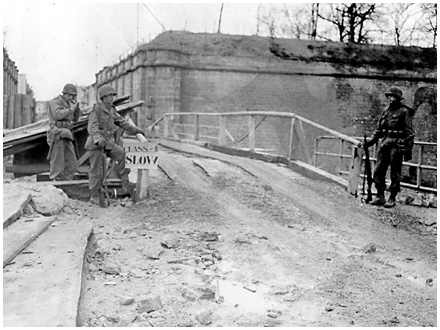
Soldiers guard one of the entrances to the walled-city of Neuf Brisach.
The only thing that was working for us now was the weather had become warmer in the past two days and there was hardly any snow left. It was hard to believe it could warm up so rapidly. We stayed in this location about four days when we were given word that we were going to push on to Neuf Brisach, the most fortified city in France. It was a walled city and the last city to surrender to the Germans when they invaded France in 1940. It was now the sixth of February 1945 and the snow was gone and the pig carcass that was frozen solid only a week prior was eaten. Our engineers had built 20-foot ladders for the infantrymen to use to scale the walls of Neuf Brisach. Our artillery had been bombarding the city for five days before. At 0300 we started our advance.
The clouds were hanging low and were extremely dense. Our upper command decided to try something new. They had searchlights reflect from the clouds so it lit up the area like early morning light. It was still dark enough to keep us concealed but light enough to see what we were doing.
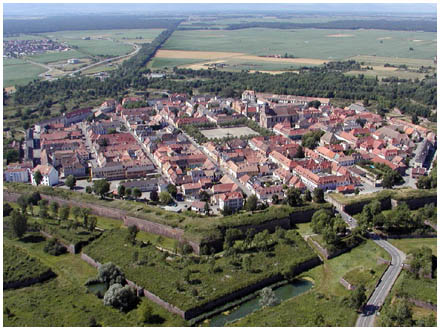
The fortress surrounding Neuf Brisach seen from the air.
As we trudged along carrying our ladders feeling like we were attacking a fortress in the Middle Ages many of our artillery shells were exploding right above us as they entered the dense clouds. The proximity fuses were sensitive. We needed that artillery to soften up the city one last time. We moved about three miles and faced the walls. In front was a moat that circled the city but fortunately it was dry.
After a patrol was sent to reconnoiter they found a drawbridge that was down. A platoon from B Company made an attack on the bridge and in a matter of minutes was in the town. The ladders were abandoned our and we went inside as fast as we could. Many buildings were on fire from the artillery barrage and most of the Germans that were left behind were ready to give up. We rounded up about 200 enemy soldiers. The oddest thing that happened was that with all the shelling the hospital, and of all things, the Gestapo headquarters were missed.
It was fortunate that the hospital was not hit because there was a baby born there as we came into the city. After everything was over the Anti-tank platoon found a four-story apartment building that was still fairly complete and we made it our home for the next eight days.
Our living quarters had good and bad things about it. It was only three blocks to the kitchen but it was right across from "artillery square" a four-block square area in the center of town where artillery was to be set up in defense of the city. Major Porter had the bright idea to fire harassing fire from this square. The Germans were firing a few rounds the first few days we were there but only about one round an hour. Our heavy weapons company was firing an 81mm mortar from the square and they could only shoot about three miles but they were reaching the other side of Rhine River.
The Major had the A&P platoon scour the countryside for all the German 75mm anti-tank ammo they could find and also an anti-tank gun. It didn't take them long to find two truckloads of ammo and a gun. So the anti-tank platoon got the honor of setting the gun in on the artillery square.
It became my duty to get the right elevation and azimuth to be able to hit a town on the other side of the river. I had to get maps from the Major and talk to him about what I wanted to hit and we agreed that it might have more effect on the enemy if we were to fire into a town. So with compass, map and quadrant I went out to where the platoon had set the gun in firing position.
Using my high school math again with the compass and map I aimed the gun at a village across the river. We had 500 rounds of ammo so if we fired four rounds an hour for 24 hours that would be about 100 rounds a day for five days. I told the men to vary the timing of the shells but fire no more than four an hour. At the end of five days we were brought a few more shells.
We fired tracers, smoke, and armor-piercing shells as they came out of the pile and it was always a surprise when a tracer went through the air at night. You could watch it arc through the dark sky. C Company was down by the river and they called and said that all the rounds were hitting on the other side and I thanked God that they were not falling short because I certainly wasn't an artilleryman. Shooting all that big-bore ammo was fun but our apartment was to close to the firing at night and made it a little difficult to sleep. We got a good idea of what an artilleryman goes through.
The nights were much more mild now than they were only a
week earlier. Spring was in the air. The temperature at night was above
freezing and the sun was usually out during the day. We even took some
photographs. With the warmer weather I think everyone had in the back of
their minds things about getting this damn war over with. We were so
tired of it.
Charles O.
Beardslee | Prelude | Signing Up | Africa | Sicily | Italy | Anzio |
Southern France | Vosges | Colmar | Wounded | Going Home
Memoir appears by
permission |